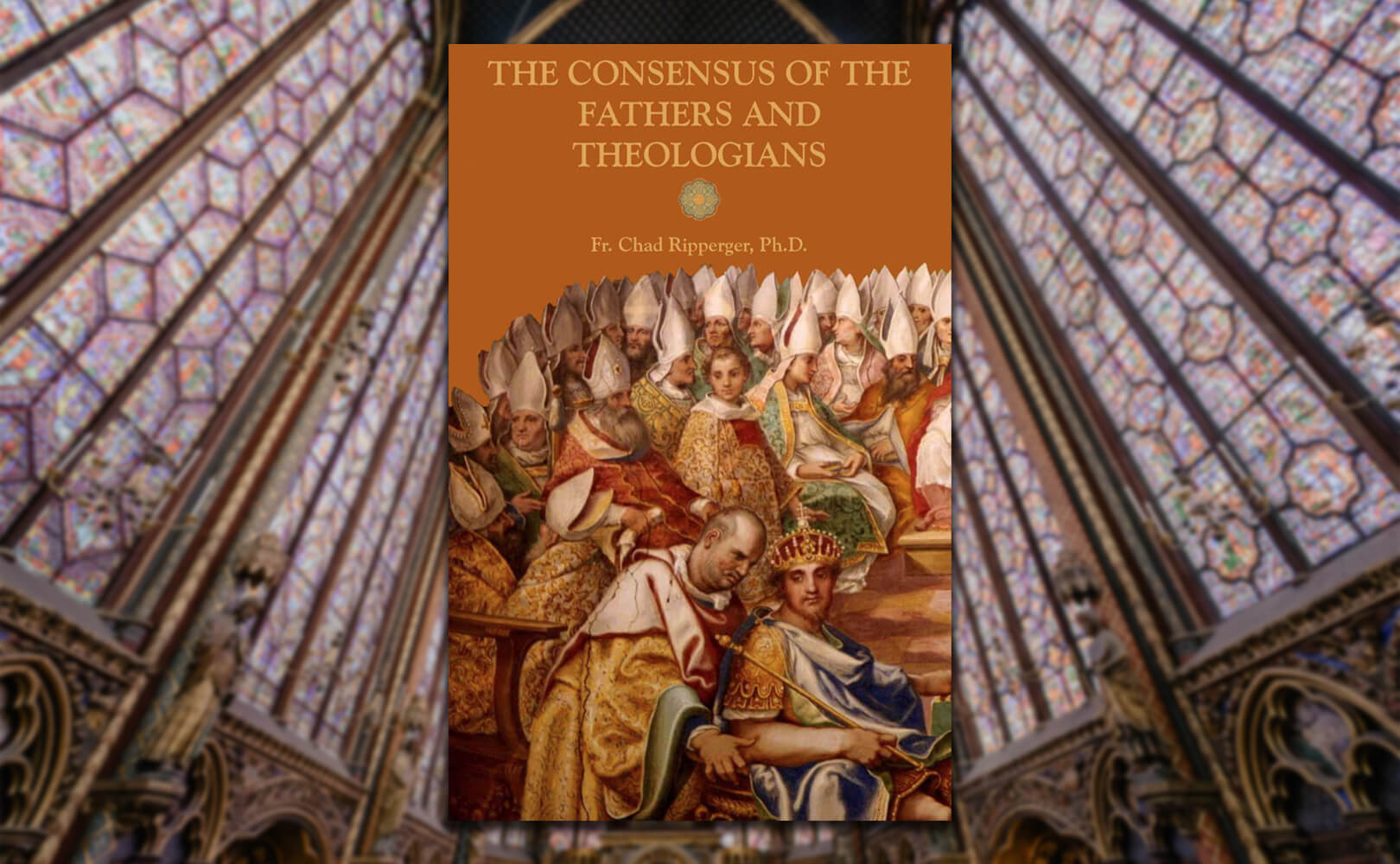 The Consensus of the Fathers and Theologians
The Consensus of the Fathers and Theologians
Fr. Chad Ripperger
Sensus Traditionis Press
35 pages
$2.99 Kindle; $6.95 Paperback
I recently discovered a little book by Fr. Chad Ripperger entitled The Consensus of the Fathers and Theologians. It really is little, at only thirty-five pages, and very inexpensive; but it is also a nugget of gold.
The author lays down two essential theses: the infallibility of the Fathers, and the infallibility of the Theologians. The Church teaches that when a moral unanimity of the Fathers are in agreement about a matter of faith or morals, that teaching is infallible. Not that the Fathers are not fallible men, but taken collectively, their doctrine is that of the infallible Church and consequently it cannot err. I should say that Fathers means the orthodox Fathers, as Fr Ripperger implies on p. 8. Indeed Fr Ripperger provides four criteria by which to recognize someone as a Father, and they are (1) antiquity, (2) sanctity, (3) orthodoxy, and (4) the express or tacit designation as a Father by the Church.
- Antiquity is defined as sometimes up to the sixth, sometimes the up to the twelfth, century. Examples of Fathers of the Church would be St Augustine (354-430), St Leo (r. 440-461), St Jerome (342-7-420), St John Damascene (675/6-749), St John Chrysostom (c. 347-407).
- Most of the Fathers have been canonized, that is to say, their sanctity is recognized by the Church. Tertullian and Origen have not been canonized; the former died as “the greatest anti-Catholic of his day;”[1] the latter may have died in heresy, and is not recognized by the Church as an orthodox Father.
- It need hardly be said that it is necessary for the men in question to be orthodox Catholics to be recognized as Fathers of the Church.
- The Church must approve the writings in question. The Fathers lived before the days of Imprimaturs, but no one will deny that the Church approves the writings of St Augustine, St Jerome, and so on.
Fr. Ripperger does not mention this, but there is included in the Creed of Pius IV, which converts used to make at their reception into the Church, a promise not to interpret Scripture contrary to the unanimous interpretation of the Fathers; which was directed against Protestants who, far from accepting the unanimous interpretation of the Fathers, were prone to interpret Scripture according to their own private judgement. That one could not interpret Scripture contrary to the unanimous interpretation of the Fathers was laid down by the Council of Trent. Why? Because the Fathers, taken collectively, form the voice of Sacred Tradition: and what they all agree on (in materia fidei et moribus, in matters of faith and morals) is apostolic, and belongs to the Faith. As cited by Fr Ripperger on page 17, from the Catholic Encyclopedia Dictionary (p. 361), “What they unanimously teach to be of the faith, is of the faith; what they unanimously reject as heretical, is heretical.”
The second half of the booklet discusses the Theologians—which Fr. Ripperger deliberately writes with a capital T. This does not mean any or every person who professes himself to be a theologian; it does not mean heretics such as Fathers Rahner and von Balthasar; it does not even mean all theologians today: but it means “those who taught in the various theological schools, such as the Dominican, Franciscan, Augustinian, and Jesuit, from the twelfth … or thirteenth century, either erected or approved by the Holy See.”[2] Fr. Ripperger provides citations that say that the Theologians taught from around 1100 to 1750. It is, on the face of it, not at all obvious why the consensus of Theologians should only be infallible up to 1750; the Holy Spirit did not cease to guide His Church in the middle of the eighteenth century, and it would have been good, I think, if more explanation had been given as to what happened around that time that brought about that cut-off date. Fr. Ripperger does, on the other hand, quote, from Zapelena, reasons why “[e]rror in the Theologians would imply error in the Church,” some of which I shall provide here. One of the main reasons for the assurance given to the Church that her Theologians, as a body, should not fall into error is the connection that these theologians have with the Holy See: among the reasons why the Theologians could not as a body fall into error are “1. The theological schools were erected by the Holy See” and “2. The scholastic teachers received permission to teach directly or indirectly from the Holy See.” Reason number 5 is that the writings of Theologians were often given a license (while heretical writings were condemned and put on the Index of Forbidden Books); reason number 7 is that “[t]he Church condemns severely the detractors of scholastic theology.”
Fr. Ripperger’s book is a very useful introduction to this aspect of theology and of Sacred Tradition. The Consensus of Fathers and Theologians shows how God preserves His Church in the truth, and keeps her free from error. Finally it is an encouragement to study the Fathers and the Theologians; and if we study these writings (as well, of course, as the Divine Scripture itself) with due dispositions, we have God’s assurance that we shall not go wrong.
NOTES:
[1] Fr Hardon, Catholic Lifetime Reading Plan
[2] Ripperger, The Consensus of the Fathers and Theologians, pp. 25-26, cited from Zapalena, De Ecclesia Christi, vol. II, p. 293.


